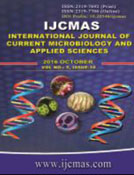


 National Academy of Agricultural Sciences (NAAS)
National Academy of Agricultural Sciences (NAAS)

|
PRINT ISSN : 2319-7692
Online ISSN : 2319-7706 Issues : 12 per year Publisher : Excellent Publishers Email : editorijcmas@gmail.com / submit@ijcmas.com Editor-in-chief: Dr.M.Prakash Index Copernicus ICV 2018: 95.39 NAAS RATING 2020: 5.38 |
Ablo is a wet bread slightly salty-sweet, steamed, originally prepared from a semi-liquid paste fermented corn widely consumed in West Africa. Nowadays, corn is substituted by rice in this food manufacturing process. The objective of this study is to determine the effect of the variation of local rice’s biochemical components induced by reproductive stage water deficit on the quality of ablo. The methodology consisted in conducting a survey in some localities in South Benin followed by the production of ablo’s samples from two varieties recently developed (ARICA 4 and NERICA 1) and the physicochemical, microbiological and sensory analyses of the samples. The survey revealed that ablo production is exclusively female’s activity which is usually inherits from relatives. Also, the results showed that three production processes of ablo depending on the raw materials used, namely, corn, rice or mixture of corn and rice. The statistical analysis revealed that there was no significant difference (P > 0.05) between pH, titratable acidity, and the yield of all of the ablo samples. However, it was found that ablo samples from non-stressed grain contained more dry matter (31.92 % to 33.14%), more total sugar (10.59% to 10.78%) and produced more foam during the fermentation process than the ablo samples obtained from grain collected from stressed plants. Also, the study showed that the fermentation process is achieved by yeasts and lactic bacteria, which tend to multiply more in ablo samples obtained from non-stressed samples. Ablo can be considered as a hygienic food because of the absence of pathogens due to its acidity and its cooking.
 |
 |
 |
 |
 |